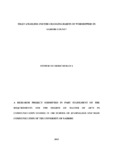| dc.description.abstract | This study sought to establish the effect of televangelism on worship habits in Kenya. More specifically, the research focused on the influence of televangelism on worship habits among worshippers in Nairobi, the impact of televangelism on church attendance amongst worshippers, the worshippers‟ credibility perception of evangelistic messages aired on television in Nairobi and the socio-economic characteristics that affect the peoples` choice between televangelism and traditional modes of worship in Nairobi. The study employed a descriptive research design where both quantitative and qualitative data was collected and analysed using descriptive and inferential statistics. From the findings, it was established that televangelism influenced worship habits as evidenced by 93% of the Christian respondents who consumed televangelism services in the period under review. In terms of the impact of televangelism on church attendance amongst worshippers in Nairobi, the study found that only 7% watched T.V programmes as an alternative to church service. In addition, only 11.9% of Christians preferred watching televangelism messages to church attendance. Majority of interviewees pointed that the „feel-good‟ messages or shallow theology being aired on T.V, made televangelism to be more attractive than church messages thus posing a real danger to the societal values that have been anchored in deep theological principles and doctrine. In terms of the worshipper‟s credibility perception of evangelistic messages aired on television, over 40% of the respondents said that televangelists were perceived to present programmes that promoted their popularity and personal gain. While majority of respondents and interviewees agreed the televangelistic messages are valid, about of the audience were hesitant to send donations to them because they did not trust their spending or they believed that the donations are for personal gain and not furtherance of the gospel. Following these findings, it is recommended that televangelists research widely about their target audience in order to deliver more compelling messages. In addition, televangelists should provide adequate information that would encourage viewers to support their ministries. Lastly, the government should establish and enforce policies and regulations that encourages genuine televangelism programming and deters televangelists who are driven by fraud and self-gain | en_US |

